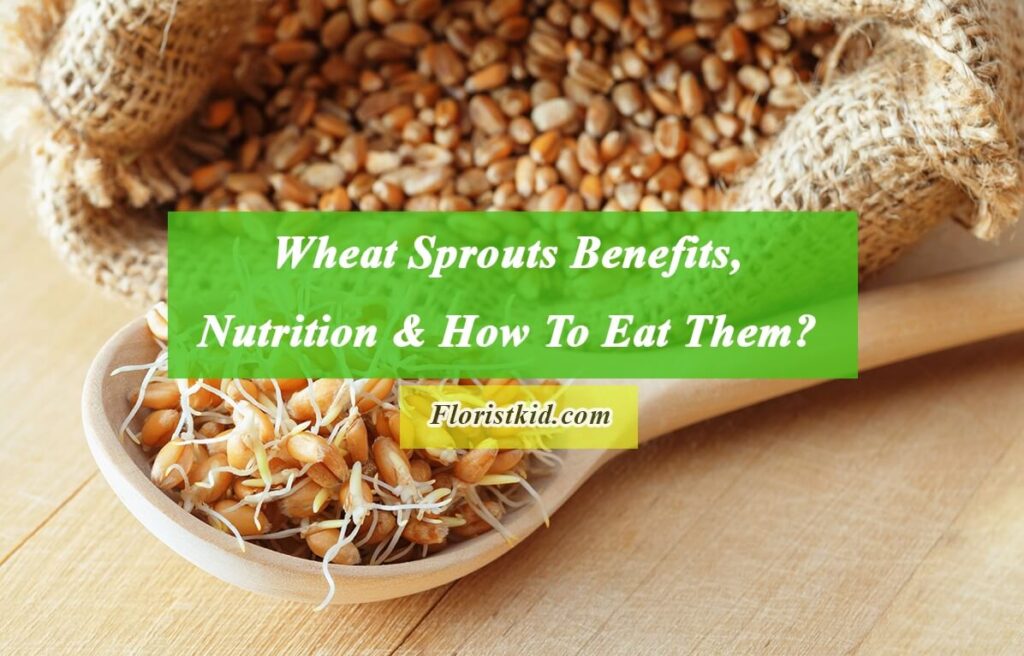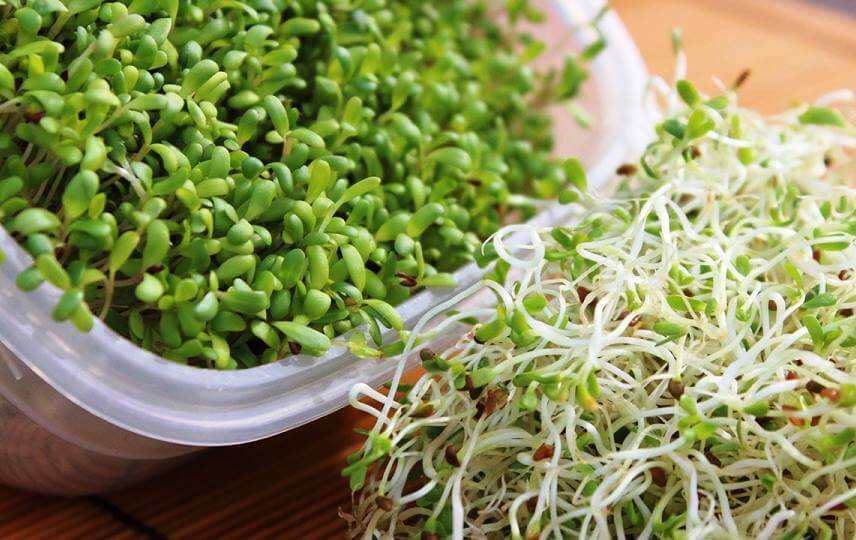Wheat sprouts, the young shoots of the wheat plant, have gained significant attention in the health and wellness community for their impressive benefits. These nutrient-dense sprouts are renowned for their rich concentration of vitamins, minerals, antioxidants, and other bioactive compounds. Incorporating wheat sprouts into your diet can provide numerous health advantages, from enhancing digestion to boosting immunity [1, 2]. Here, we assess the primary health benefits of wheat sprouts and why they deserve a spot in your daily nutrition.
If you are interested in this topic, you can also read
<<Clover Sprouts Benefits >> and <<Broccoli Sprouts Benefits>> articles.
Wheat Sprouts Benefits
Rich In Essential Nutrients
Wheat sprouts are a source of essential nutrients. They are particularly high in vitamins A, C, and E, all of which are vital for maintaining healthy skin, vision, and immune function. Additionally, wheat sprouts contain a variety of B vitamins, including folate, which is crucial for DNA synthesis and repair [3].
High Antioxidant Content
Antioxidants are compounds that help combat oxidative stress and protect cells from damage caused by free radicals. Wheat sprouts are rich in antioxidants such as vitamins C and E, flavonoids, and phenolic acids. These antioxidants can help reduce the risk of chronic diseases, including heart disease, diabetes, and certain cancers [4, 5].
Boosts Digestive Health
The fiber content in wheat sprouts is beneficial for digestive health. Dietary fiber aids in maintaining regular bowel movements and can prevent constipation. Moreover, the enzymes present in wheat sprouts can assist in the digestion and absorption of nutrients, making your digestive system more efficient [6].
Supports Immune Function
Wheat sprouts’ immune-boosting properties are attributed to their high levels of vitamins and minerals, particularly vitamin C, zinc, and selenium. These nutrients play a critical role in enhancing the body’s immune response and protecting against infections [7].
Promotes Heart Health
Wheat sprouts contribute to heart health in several ways. The antioxidants help prevent oxidative damage to the cardiovascular system, while the high fiber content can reduce cholesterol levels. Additionally, the presence of magnesium helps regulate blood pressure and supports overall cardiovascular function [8, 9].
Regulates Blood Sugar Levels
For individuals with diabetes or those looking to maintain stable blood sugar levels, wheat sprouts can be particularly beneficial. The fiber in wheat sprouts slows down the absorption of sugars in the bloodstream, preventing spikes in blood glucose levels. This helps manage and prevent type 2 diabetes [10].
Enhances Skin Health
Wheat sprouts’ vitamins and antioxidants can also benefit your skin. Vitamin E, for instance, is known for protecting the skin from oxidative stress and UV damage. Regular consumption of wheat sprouts can result in healthier, more radiant skin [11].
Supports Weight Management
Incorporating wheat sprouts into your diet can aid in weight management. The fiber content promotes a feeling of fullness, reducing overall calorie intake. Moreover, the low-calorie and nutrient-dense profile of wheat sprouts makes them an excellent addition to weight-loss diets [12].
Improves Mental Clarity And Mood
Wheat sprouts contain B vitamins, magnesium, and other essential nutrients that support brain function and mental clarity. These nutrients are involved in producing neurotransmitters, which regulate mood and cognitive function. Consuming wheat sprouts can, therefore, help improve mental clarity and reduce the risk of depression and anxiety [13].
Detoxifying Properties
Wheat sprouts contain various phytonutrients, including chlorophyll, which has detoxifying and anti-inflammatory properties. Chlorophyll helps cleanse the liver and can assist in eliminating toxins from the body, leading to improved energy levels and better overall health [14].
Wheat Sprouts Nutritional Value
As wheat seeds begin to sprout, the nutritional content of the wheat kernel transforms, becoming more bioavailable and rich in essential vitamins, minerals, and other beneficial compounds. This makes wheat sprouts a powerful source of nutrition for your overall health. Here is an in-depth look at the nutritional value of wheat sprouts and how they can improve your diet.
Table 1. Nutritional value of wheat sprouts [15]
| Nutrients | Quantity |
|---|---|
| Vitamin A (retinol equivalents per 100 g d.w) | 0.81 |
| Vitamin E (mg α-tocopherol kg–1 d.w.) | 1.95 |
| Vitamin B1 (mg thiamine kg–1 d.w.) | 0.84 |
| Vitamin B2 (mg riboflavin kg–1 d.w.) | 0.73 |
| Vitamin B6 (mg pyridoxal kg–1 d.w.) | 6.69 |
| Vitamin C (mg ascorbic acid kg–1 d.w.) | 18.40 |
| Ca (g kg–1 d.w.) | 0.29 |
| Cu (mg kg–1 d.w.) | 37.49 |
| Fe (mg kg–1 d.w.) | 30.44 |
| K (g kg–1 d.w.) | 1.43 |
| Mg (g kg–1 d.w.) | 0.84 |
| Mn (mg kg–1 d.w.) | 29.79 |
| Na (g kg–1 d.w.) | 1.13 |
| Zn (mg kg–1 d.w.) | 56.24 |
Carbohydrates
Wheat sprouts are a source of complex carbohydrates, providing a steady energy release. The germination process breaks down some of the starches into simpler sugars, making them easier to digest. This can help maintain stable blood sugar levels and provide sustained energy throughout the day [16].
Proteins
Proteins are essential for building and repairing tissues, and wheat sprouts are a good source of plant-based protein. They contain all nine essential amino acids, though in varying amounts, making them a valuable addition to a balanced diet, especially for vegetarians and vegans [17].
Fats
While wheat sprouts are low in total fat, they contain essential fatty acids, including omega-3 and omega-6 fatty acids, which are important for maintaining cell membrane integrity and supporting brain health [18].
Enzymes
The germination process activates enzymes in wheat sprouts, aiding digestion and improving nutrient bioavailability. These enzymes help break down proteins, fats, and carbohydrates, making it easier for the body to absorb and utilize these nutrients efficiently [19].
Fiber
Wheat sprouts are an excellent source of dietary fiber, which is essential for digestive health. Fiber helps regulate bowel movements, prevent constipation, and maintain a healthy gut microbiome. Additionally, fiber can help control blood sugar levels and lower cholesterol, contributing to overall cardiovascular health [20].
How To Eat Wheat Sprouts?
As a versatile ingredient, wheat sprouts can be easily incorporated into various dishes, adding both nutritional value and a fresh, slightly sweet flavor. Whether you are new to wheat sprouts or looking for creative ways to enjoy them, this guide will provide you with practical tips and delicious ideas for incorporating them into your diet [21].
Raw Wheat Sprouts
Eating wheat sprouts raw is one of the simplest ways to enjoy their nutritional benefits. Here are a few methods to incorporate raw wheat sprouts into your meals [22]:
Salads
Toss a handful of wheat sprouts into your favorite salads. They add a pleasant crunch and an improvement in nutrition. Pair them with leafy greens, tomatoes, cucumbers, and a light vinaigrette for a refreshing, healthy meal.
Sandwiches And Wraps
Add a layer of wheat sprouts to sandwiches and wraps for extra texture and flavor. They work well with a variety of fillings, including turkey, chicken, hummus, avocado, and fresh vegetables.
Smoothies
Blend wheat sprouts into smoothies for a nutrient-dense drink. Combine them with fruits like bananas, berries, and spinach, along with a splash of almond milk or yogurt, for a delicious and energizing smoothie.
Cooked Wheat Sprouts
While raw wheat sprouts are most commonly consumed, you can also cook them. However, cooking may reduce some of their nutritional value, particularly their enzyme content. Here are some ways to enjoy cooked wheat sprouts [23]:
Stir-Fries
Add wheat sprouts to vegetable stir-fries for added nutrition and a slight crunch. They pair well with other vegetables like bell peppers, carrots, and broccoli and can be seasoned with soy sauce, garlic, and ginger.
Soups And Stews
Stir wheat sprouts into soups and stews just before serving to preserve their texture. They can enhance the nutritional profile of various soups, from vegetables and lentils to chicken and beef.
Casseroles And Grain Bowls
Mix wheat sprouts into casseroles and grain bowls. They add a nutritious element to dishes like quinoa bowls, rice pilafs, and baked casseroles.
Baked Goods
Incorporating wheat sprouts into baked goods is another way to enjoy their benefits. They can be added to both savory and sweet recipes:
Bread And Muffins
Fold wheat sprouts into bread and muffin batter before baking. They can add moisture and a slight nutty flavor to whole grain breads, rolls, and even muffins.
Cookies And Bars
Mix wheat sprouts into cookie and granola bar recipes. They pair well with ingredients like oats, nuts, seeds, and dried fruits, adding a nutritional boost to your treats.
Sprout Salads And Bowls
Wheat sprouts can be the star ingredient in sprout salads and bowls. Combine them with other sprouted grains and seeds for a nutrient-packed meal [24]:
Sprout Salad
Create a vibrant sprout salad with a mix of wheat, alfalfa, and mung bean sprouts. Add chopped vegetables, nuts, seeds, and a tangy dressing for a refreshing dish.
Buddha Bowls
Assemble a Buddha bowl with a base of quinoa or brown rice, topped with wheat sprouts, roasted vegetables, chickpeas, avocado, and a drizzle of tahini or lemon dressing.
Creative Snacks
Wheat sprouts can be used in a variety of creative snacks:
Energy Balls
Blend wheat sprouts with dates, nuts, and cocoa powder to make nutritious energy balls. These make for a convenient and healthy snack on the go.
Sprouted Hummus
Blend wheat sprouts into your homemade hummus for an extra nutrient boost. Serve with fresh veggies or whole grain crackers.
Conclusion
Incorporating wheat sprouts into your diet can provide many health benefits, ranging from improved digestion and enhanced immunity to better heart health and weight management. Their rich nutrient profile and antioxidant properties make them a valuable addition to any healthy eating plan. Whether you add them to salads and smoothies or enjoy them on their own, wheat sprouts can be a delicious and nutritious addition to your daily routine.












